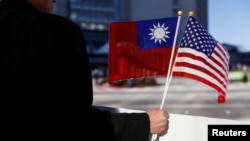A senior U.S. official will head to Taiwan for what State Department officials say is to "reaffirm long-standing U.S. policy toward and support for Taiwan."
Alex Wong, deputy assistant secretary of state for East Asian and Pacific affairs, is scheduled to visit Taiwan March 20-22 after meetings in Singapore.
While in Taiwan, Wong will deliver remarks at the American Chamber of Commerce's annual Hsieh Nien Fan dinner, an opportunity for the American business community to meet with Taiwanese officials to facilitate further interaction in the year ahead.
Wong will also hold discussions with Taiwanese officials on a wide range of matters, according to the State Department.
"It makes sense that the Trump administration is willing to strengthen ties with Taiwan. No one should be surprised," Bonnie Glaser, director of the China Power Project at Center for International and Strategic Studies, told VOA on Monday. "China's growing political, military, and economic pressure on Taiwan is a threat to Taiwan's security and harmful to U.S. interests."
Wong's visit will come just days after U.S. President Donald Trump signed the Taiwan Travel Act. The legislation encourages unrestricted two-way travel for officials from the United States and Taiwan. It is also seen as a move to facilitate direct official U.S. contacts with the self-ruled island, which were cut in 1979 when Washington switched diplomatic recognition from Taipei to Beijing.
The informal relations between the United States and Taiwan are governed by the Taiwan Relations Act that was passed by Congress in April of 1979.
As part of the deal, the United States imposed unwritten rules, including prohibiting higher-level American officials from meeting with their Taiwan counterparts, and preventing top Taiwan officials from coming to Washington, D.C.
According to the Taiwan Travel Act, relations between the United States and Taiwan “have suffered from a lack of communication due to the self-imposed restrictions that the United States maintains on high-level visits with Taiwan” since the enactment of the Taiwan Relations Act.
While U.S. and Taiwan officials have already been traveling back and forth to meet, the visits were usually kept low profile to avoid diplomatic repercussion.
China reacted angrily to the bill.
Foreign ministry spokesman Lu Kang said on Saturday: "We urge the US side to correct its mistake, stop pursuing any official ties with Taiwan or improving its current relations with Taiwan in any substantive way."
The Chinese Embassy issued a statement saying that certain clauses of the legislation "severely violate the one-China principle, the political foundation of the China-US relationship."
The move is likely to weigh heavily on US-China ties, which are currently under strain after Trump announced new import tariffs on steel and aluminum.
China claims democratically-ruled Taiwan is part of its territory. China's relationship with Taiwan took a turn for the worse since the 2016 inauguration of Taiwanese President Tsai Ing-wen, who has refused to endorse Beijing's view that the island belongs to it.








